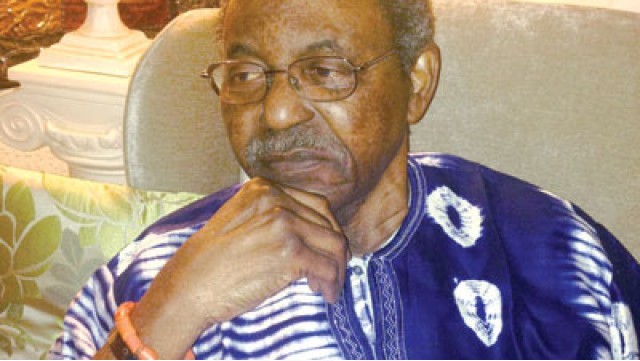
By Victor Eromosele
If there was one man who could change the world through his writing, it was probably the gifted Peter Enahoro (also known by his pen name, ‘Peter Pan’). He wrote lucid prose and had the rare courage to take on big issues other journalists dare not take on.
To know the great man, you only need to read his 2009 hefty 744-page book, Then, spoke the Thunder. It reads in part as an autobiography and as a personal and country political history. No reader will miss the riveting account of the Nigerian coups in 1966 January 15 and July 29, events that changed the country forever. The book gives an authentic insight into the travails of the author, on the one hand, and of his fatherland that forced him into exile 56 years ago. I found most of interest, two of the book’s seven parts – Part 3: The Peter Pan Years and Part 4: Farewell to the Fatherland.
The announcement of his passing away in London, England on April 23, 2023, at 88, came to me as a shock. My Government College Ughelli (GCU) classmate, Lee Foss who lives in Cambridge, England sent me the text message that ruined my day. There is always a family member the entire family is proud of. If you consider Government College Ughelli Old Boys’ Association (GCUOBA) as one such family, Peter Enahoro was a member the global fraternity was proud of. Why? He was not just a genius; he was a legend of his time. His fame preceded him. Like his older journalist-politician brother, Anthony, he was editor of Africa’s highest circulating newspaper, Daily Times in his 20’s. He was a member of the GCU Class of 1948 and was in the same class as the Professor Emeritus John Pepper Clark, who recently passed away.
He introduced Chapter 10: Gathering Clouds, in Then, spoke the Thunder with these words:
“At 27, I was appointed Editor of the Daily Times. The promotion came as a poisoned chalice: it boosted a new authority for the Peter Pan Column but at a price that would eventually drive me out of my homeland.”
The military rulers of the 1960s may not have shared the sense of humour of a witty, daring journalist. Ughelli must have taught Peter Enahoro to respect authority yet speak his mind. Of course, it is arguable whether the “pen is mightier than the sword.” In his case, he had a ‘smoking gun’ to contend with and had the rare courage to do so.
Although we never personally met but three GCU-related activities that had my involvement, featured the late Legend. The most recent was a 2020 Award. Interestingly, I serve as chairman on the Old School’s Archives & Library Project (ALP) Committee, inter alia with responsibility for recommending additions to GCU’s unique museum-styled Powell Archives & Reference Library. The Committee worked with the National Exco in deciding to mark GCU @ 75 in January 2020 by presenting a handful of highly accomplished old boys, the GCU Leading Lights in Humanities Award. Looking back, how pleased I am that Peter was on the list and got his well-deserved recognition while still alive. How sad though, that at least four others on the list have, in just over three years, passed away: Professor Obaro Ikime, Professor Emeritus John Pepper Clark, Ambassador Blessing Clark and Professor Egerton Uvieghara.
An earlier involvement was when, in collaboration with Lee Foss, we in 2017 decided to mark fifty years of the GCU Entry Class of 1967. I was working on the class brochure, Lads of 1967 and needed a famous guest writer. Why not Peter Enahoro? We got lucky. His unique four-page article, “Yes, we had a Life,” made its way to page 42 of our brochure. In his words: “When Lee Foss asked if I would contribute to a proposed publication for your class that came almost two decades after my 24-student Class of September ‘48, and I was informed that there were 90 students in the intake of 1967, I frankly almost freaked out.” This guy left GCU the month and year I was born! Yet he writes stories of his time as though the events happened yesterday. What a great storyteller. When you read Peter Pan, watch out for the punch line: “My generation launched the Civil War. Your generation was a victim of that recklessness.” That is the vintage wordsmith: he knows how to humorously inject a twist of irony in his writing and see interesting relationships in events, that the regular journalist never sees. Yes, GCU Class of 1967 is the only class so honoured by our beloved Peter Pan, who is no more.
The third involvement was when working to provide content for the school’s Powell Archives & Reference Library, my committee created in 2012 a Wall of Fame, My Years at GCU. We got prominent old boys to, in their own words, tell us about the GCU of their time. I exchanged emails with him and got the powerful one-pager which can be read by any visitor to GCU’s PARL. Excerpts from the timeless document read:
“Every waking moment of the day was programmed beyond the framework of classroom and homework periods. Siesta, when no reading was permitted, was compulsory. Because I was promoted early to the top teams of all three principal sports of the school, gaining the athletics, cricket and football colours, the daily burning of physical energy was compounded for me in later years by responsibilities of Head of School House, captain of football and school prefect.
“My two fondest teachers were Mr Stevens, a young easy-going Oxbridge type who taught English, my favourite subject. The other was E.C. Halim, mathematics teacher, with a flair for communicating a subject I found difficult, plus the fact that he coached the school football XI and I never heard him raise his voice in anger.
“Left-over traits from Ughelli that may be associated with me include self-confidence, camaraderie and contempt for materialistic tendencies. I have a heightened sense of fairness, revulsion at bullying and I am completely detribalized.”
Apart from his powerful, famous column, “Peter Pan,” published for decades in the Daily Times in 1960s and 1970s and of course, his African Now magazine he published in exile from London, ironically, it is his witty 1966 little book, How to be a Nigerian (still reproduced till this day) that remains his best-seller of all time. It provides an authentic cultural induction for any expatriate or foreigner visiting the country for the first time. The reader encounters a light-hearted but serious side of the great wordsmith in advisory mode.
In dedicating his last book to his sons, he urged: “Proudly don the beautiful garment that is your history; it defines your identity and earmarks your cubicle in humanity’s archives.” The great dad and family man set an example, by doing just so. He left a legacy. He proudly “donned his beautiful garment,” with a place assured “in humanity’s archives.” The thunder has finally subsided, and the rain pours as the world shed tears, mourning a great loss. Our thoughts are with his family. The world of journalism and GCU old boys around the globe will sorely miss a jolly good fellow.
Eromosele is a former NNPC Executive and past VP of GCUOBA Lagos Branch



